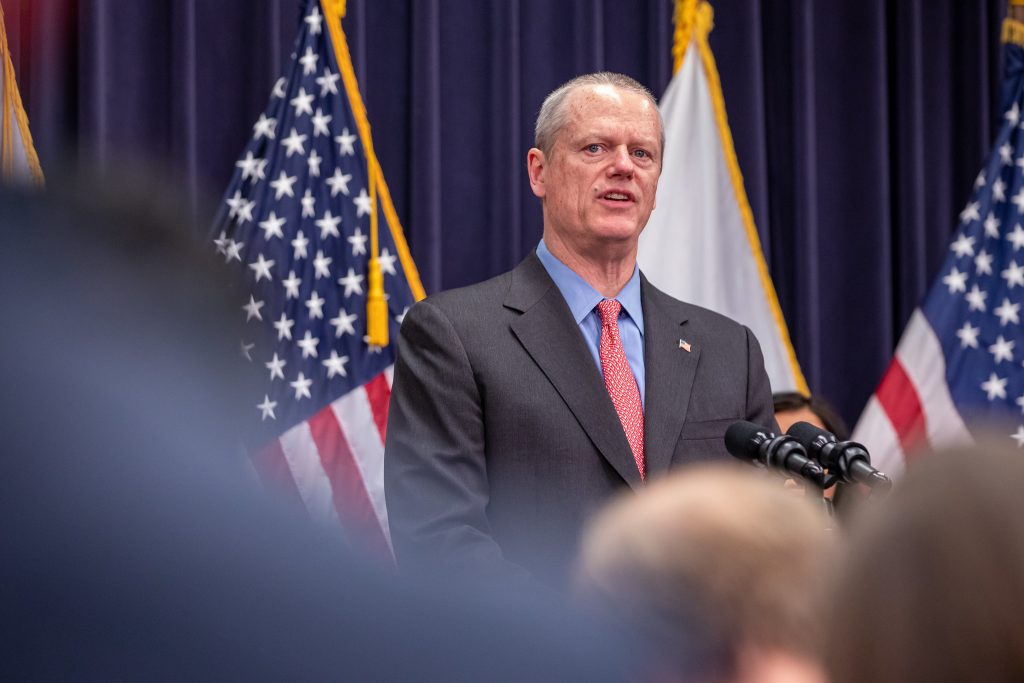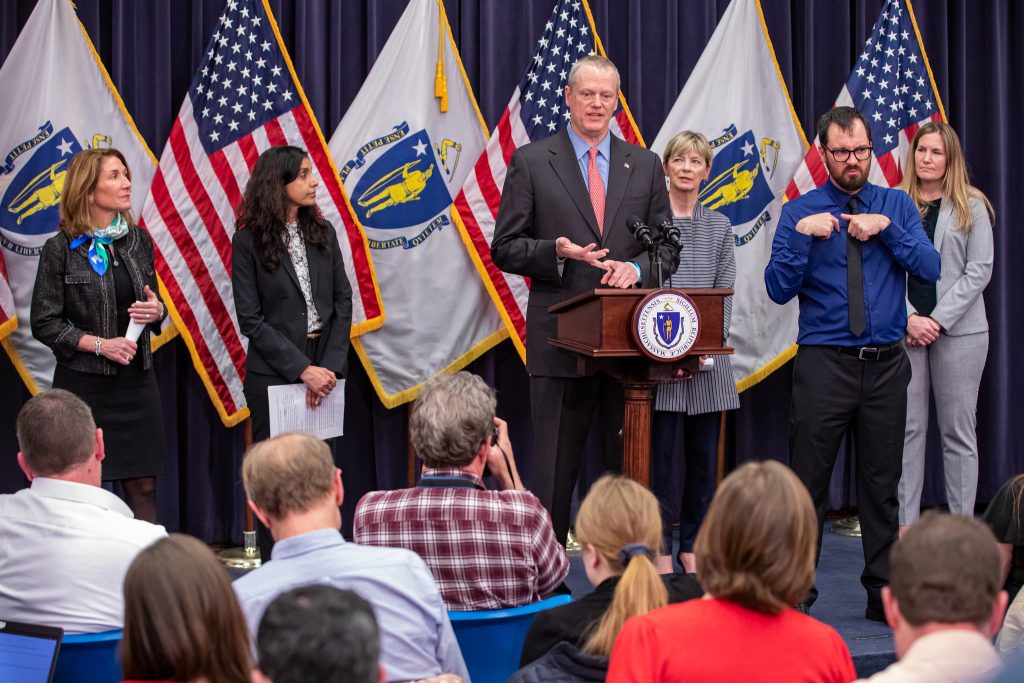Commonwealth’s Response to Coronavirus
Administration issues updated guidance for the public & Executive Branch employees around large events and travel

BOSTON – Today Governor Charlie Baker declared a State of Emergency in Massachusetts to support the Commonwealth’s response to the outbreak of Coronavirus.
The Baker-Polito Administration also announced new guidance for Executive Branch employees in order to prevent and mitigate the spread of COVID-19. This includes discontinuing all out-of-state work-related travel, canceling or virtually holding conferences, seminars, and other discretionary gatherings, informing employees not to attend external work-related conferences, seminars, or events, reminding employees feeling sick with fever or flu symptoms to not come into work, and encouraging high-risk employees to talk with their supervisors to review possible alternative work assignments.
Regular internal government business will continue, and these new measures complement other precautions that have been put in place in recent days encouraging proper self-care and hygiene and increasing cleaning and sanitizing of Executive Branch buildings and offices.
“Today, I have declared a state of emergency in Massachusetts to further support our response to Coronavirus,” said Governor Charlie Baker. “We will continue planning and preparing to mitigate the spread of this disease and have issued new guidance for Executive Branch employees in the Commonwealth. I urge employers and other large organizations to follow our example and limit or eliminate non-essential travel, limit or eliminate large events where possible and explore telework where appropriate for your organization. We are also urging older adults and those with health issues to avoid large crowds and large events.”

“Our Administration believes it is important to start taking additional actions now to mitigate spread based on the information we have available, including issuing the enhanced guidance for Executive Branch employees which prohibits nearly all work-related travel, limits or cancels large events, and encourages teleworking where it is appropriate,” said Lt. Governor Karyn Polito. “Our state agencies will continue to coordinate daily with health care professionals, educational institutions and federal and local partners on preparedness efforts for COVID-19.”
The guidance for Executive Branch employees goes into effect on Wednesday, March 11, and will be revisited in 30 days or sooner as circumstances dictate. The full details are as follows:
- All work-related travel, both foreign and domestic, is to be discontinued until further notice. Executive Branch employees are also strongly encouraged to avoid any personal international travel.
- Conferences, seminars and other discretionary gatherings, scheduled and hosted by Executive Branch agencies involving external parties, are to be held virtually or canceled. Regular internal business shall continue, including but not limited to mandated public hearings and board meetings. Meeting organizers are strongly encouraged to utilize alternatives like conference calls, WebEx and other group communication tools.
- Additionally, Executive Branch employees should not attend external work-related conferences, seminars or events. Alternatively, Executive Branch employees are encouraged to participate remotely.
- Executive Branch employees feeling sick with fever or flu symptoms should not come into work. Information available to date regarding COVID-19 indicates that the highest risk population includes older adults and individuals with serious chronic medical conditions. Employees in this risk group are encouraged to talk with their supervisors to review possible alternative work assignments.
- These actions complement additional precautions that have been undertaken in recent days including encouraging proper self-care and hygiene such as washing hands, ensuring bathrooms are stocked with handwashing materials and paper products, frequently cleaning touchpoints such as doorknobs, handles, elevator buttons, and common area surface, and making cleaning products and sanitizers available in all Executive Branch workspaces.
The Massachusetts Emergency Management Agency (MEMA) has been activated and is bringing together health, human services, public safety, and several other government agencies. This working group follows the Department of Public Health’s infectious disease task force that was stood up in January.
The Administration also issued updated guidance to members of the public. This guidance is posted on the Department of Public Health’s website,www.mass.gov/2019coronavirus.
The Administration urges older adults and those with health issues to avoid large crowds and events. Individuals who live in households with vulnerable people, like elderly parents, should also consider avoiding crowds.
Tomorrow, DPH will distribute guidance to long term care facility operators. This guidance will outline how these facilities should protect elderly residents at higher risk for Coronavirus. This will include banning visitors who show signs or symptoms of a respiratory infection (fever, cough, shortness of breath, or sore throat). Visitors will be prohibited if in the last 14 days they had contact with someone with a confirmed diagnosis of COVID-19, are under investigation for COVID-19 or have been sick. Visitors will be prohibited if they have traveled internationally in the last 14 days or are residing in a community where community-based spread of COVID-19 is occurring. Visitors will not be allowed to visit long term care facilities if they currently feel sick or exhibit symptoms.
On public transportation, the MBTA will continue to disinfect surfaces and vehicles in line with its new cleaning protocol, but the Administration encourages older adults and those with underlying health issues to avoid large crowds of possible.
Regarding K-12 schools, the Department of Secondary and Elementary Education(DESE) is providing local schools with relief from attendance and school year requirements so that schools have the flexibility to make decisions on temporary closures due to Coronavirus concerns. More specifically:
- The longest that any school district will be required to go is its scheduled 185th day. No schools will be required to be in session after June 30th.
- For accountability purposes for school year 2019-20, DESE will calculate chronic absenteeism as of Monday, March 2, 2020, and disregard all attendance data for the remainder of the school year.
- DESE Commissioner Jeff Riley is strongly urging all districts to cancel all out-of-state travel at this time. This is in addition to the Administration’s existing request for schools to cancel international trips.
- The Department of Public Health will be issuing updated guidance to Superintendents on how to address cases that arise at a school, including potential school closures.
The public is also reminded of steps to take to limit the spread of COVID-19:
- Cover your mouth – when you cough or sneeze use a tissue or your inner elbow, not your hands.
- Wash your hands – with soap and warm water or use an alcohol-based sanitizing gel.
- Stay home if you are sick – and avoid close contact with others.
The Administration will continue to update the public on further developments and individuals are encouraged to consult both the Department of Public Health and the Centers for Disease Control and Prevention websites for the most up to date information.

